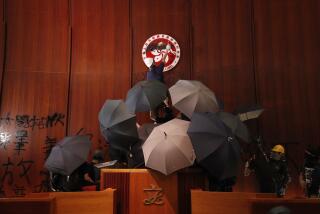Protesters, government far apart in Hong Kong talks
As the ranks of protesters thinned Monday after nine days of democracy demonstrations, Hong Kong student protest leaders and government officials said they were continuing to hold informal -- but decidedly preliminary -- talks.
The goal is to determine how to hold more formal negotiations that would discuss rules for the territory’s 2017 election.
But with the two sides having staked out positions that seem miles apart, the key question looming over the process was: Is there anything to talk about?
“We don’t want this to be just a consultation or chat,” Lester Shum, deputy leader of the Hong Kong Federation of Students, said at a late-night news conference, explaining that no deal had been reached yet on what, substantively, would be up for discussion.
“We want a binding agreement, we want concrete results. … What we are aiming for is to break this impasse and advance political reform, but the government hasn’t shown signs of wanting to do that.”
Nevertheless, the specter of a negotiated deal – combined with sheer fatigue – seemed to help pare the crowds of demonstrators at two main protest sites Monday in the semiautonomous Chinese city for over a week.
Some schools reopened and civil servants were able to enter the government’s main offices in the Admiralty district. But the main thoroughfare running through Admiralty remained blockaded, as did streets in the working-class Mong Kok neighborhood.
A government official said late Monday that progress was being made in preliminary talks with the federation. “We hope we’ll be able to hold a talk within this week and in an open, transparent manner,” said Ray Lau, undersecretary of the Mainland and Constitutional Affairs Bureau.
The details of the election rules are complex, but essentially boil down to a dispute over who gets to determine who will be a candidate for the city’s top job, chief executive, in 2017.
Since the former British colony returned to Chinese sovereignty in 1997 under a framework known as “one party, two systems,” the chief executive has been chosen by an election committee; its membership has gradually expanded and it now consists of 1,200 people.
But the 1997 framework, enshrined in a document known as the Basic Law, also said that ultimately Hong Kong was to move toward a system of “universal suffrage upon nomination by a broadly representative nominating committee in accordance with democratic procedures.”
The current chief executive, Leung Chun-ying, was elected to a five-year term in 2012 with 689 votes of the 1,200-member committee. Critics of the system say the committee is not broadly representative of Hong Kong society but is stacked with businesspeople and others with pro-establishment views.
In August, after having received a “public consultation” report from Leung about conditions in the territory and attitudes toward the 2017 vote, the standing committee of China’s legislature, the National People’s Congress, issued a framework for the elections.
The committee said that in 2017 the public could for the first time cast ballots for the chief executive. But each candidate, it said, must be endorsed by more than half of the members of the election committee, and no more than three candidates can be endorsed.
Those restrictions infuriated many in Hong Kong, who said that a “one person, one vote” system would be meaningless if all the candidates are in effect screened by a group of pro-Beijing gatekeepers.
Many of those taking to the streets have called for a “civil nomination” process, meaning anyone who attracts some minimum level of public support through, for example, a verified signature campaign could stand as a candidate in the 2017 vote.
But Beijing authorities have insisted repeatedly that its framework for 2017 elections is nonnegotiable.
Still, Michael Davis, a law professor at Hong Kong University, said that there may be room to maneuver.
One way to allow Beijing to save face, Davis said, would be to let Leung’s administration to “take the heat” and essentially propose a do-over, setting aside his initial report to the standing committee and then coming up with alternative recommendations.
“But the government in effect would be somewhat defying Beijing by starting over,” Davis said.
Another way would be for Leung to step down, as students have demanded, essentially making him the scapegoat and allowing a new set of proposals.
In an opinion piece for the local English-language South China Morning Post, political commentator and former government official Joseph Wong Wing-ping said Monday that Leung’s resignation could “provide a window for reconciliation” and allow Leung’s previous report to be tabled.
That option is likely to be “strongly rejected publicly by Beijing and the Leung administration” in the near term, Wong predicted. But “in due course it may turn out to be a less repugnant choice to China” than a violent crackdown to clear protesters from the streets, as Communist leaders opted for in 1989 when students led a six-week occupation of Beijing’s Tiananmen Square, he said.
If the protesters and the Hong Kong government did agree to a do-over and sell that idea to Beijing, they conceivably could discuss keeping the election committee but expanding it and making it more inclusive, though Davis said he regarded that as an unlikely option.
Another slightly more likely avenue of discussion, Davis said, was that the two sides could agree to keep the election committee in its present form, but lower the threshold of support a candidate would need from one-half to, say, one-eighth to be included on the ballot.
Such a change, Davis said, would probably allow someone from Hong Kong’s liberal “pan-democratic” camp to run for the chief executive post.
“But whether some students are willing to live with that is another question,” Davis said. Giving up on civil nomination “would be a big climb down,” he said.
And although many members of Hong Kong’s pan-democratic parties might agree, Davis said, “they’re not going to latch on to something if they think they’re going to be attacked by the students for selling out.”
Many observers have predicted that Beijing will not budge on its stance.
But if the student federation and other protest groups can engineer a tactical retreat from the streets in the coming days -- proving that they have the ability not only to bring demonstrators into the streets but also get them to go home – that could increase their bargaining power.
Alternatively, they could attempt to hold out and continue to mass large crowds at sit-in sites, which would also add pressure to the government to negotiate but erode wider public support.
“There’s a contest going on for hearts and minds between the protesters and the government,” Davis said. “The government clearly lost round one when it started gassing students.”
Special correspondent Violet Law contributed to this report.
Follow @dhpierson and @JulieMakLAT on Twitter for news out of the Hong Kong protests.
More to Read
Start your day right
Sign up for Essential California for news, features and recommendations from the L.A. Times and beyond in your inbox six days a week.
You may occasionally receive promotional content from the Los Angeles Times.








